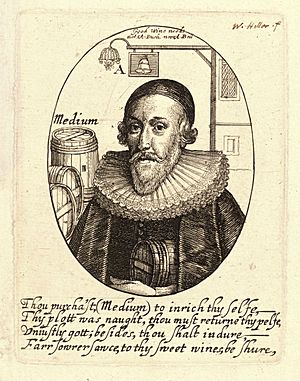William Abell facts for kids
William Abell was an important English businessman who lived a long time ago (from about 1584 to after 1655). He was a vintner, which means he sold wine. He became the leader, or "master," of the Vintners' Company, a group for wine sellers in London. He also worked in London's government as an alderman (a city council member) and later as sheriff of London (a top official). William Abell was involved in a big disagreement about how wine was sold and who could sell it.
Contents
Who Was William Abell?
William Abell was born in a town called Oundle. His parents were Thomas Abell and Suzanna Barker. When he was young, between 1598 and 1602, he started learning the wine business with the London Vintners' Company.
His Family and Business
Abell owned a famous wine shop called The Ship tavern. It was located near Old Fish Street in London. He was married and had four children.
His Rise in the Vintners' Company
William Abell worked hard to gain important positions within the Vintners' Company.
- In 1614, he became a liveryman, a full member of the company.
- In 1628, he was chosen as an assistant.
- By 1637, he became the "master" of the company, which was the highest position.
His Role in London's Government
Abell also wanted to be involved in London's government.
- In 1634, he was elected as a deputy alderman for the Queenhithe area.
- In 1636, he became an alderman for the Bread Street area.
- In 1637–1638, he was elected sheriff of London, a very important job in the city.
The Wine Business Disagreement
William Abell was involved in a big argument about how wine was sold in England. At that time, King Charles I needed money. He asked the Vintners' Company for a lot of money, which was not allowed by law.
Working with the King
The Vintners' Company did not want to pay the king. But William Abell, with help from the Marquis of Hamilton and his cousin Richard Kilvert, tried to make a deal. They convinced the wine sellers to agree to pay the king 40 shillings for every large barrel (called a tun) of wine they sold. In return, the wine sellers were allowed to charge their customers an extra penny for each bottle.
Abell's New Job
Abell was chosen as one of the people in charge of collecting this new tax. However, many wine merchants refused to pay it. Abell asked the government for help to make them pay.
Becoming Unpopular
By 1639, many people in London saw Abell as someone who supported the government too much and only cared about getting powerful jobs. He became the person who gave out licenses to tavern owners. This job made him even more unpopular.
Challenges and Later Life
Soon after the Long Parliament started meeting, William Abell was called to explain his part in the wine tax.
Facing Parliament
- On November 27, 1640, the House of Commons ordered him to be held by the sergeant-at-arms. He was not allowed to leave.
- On May 26, 1641, Parliament decided to create a special law against Abell and Kilvert. They were called "projectors" because they helped create the wine tax.
- On September 1, Abell was finally allowed to leave after paying a very large amount of money as a promise to return.
- On April 9, 1642, he was called a "delinquent" (someone who had done wrong). He offered to apologize to Parliament. He was promised a pardon if he paid £2,000.
- In the same year, he left his job as an alderman.
Later Imprisonment
About ten years later, William Abell was put in prison again.
- On March 12, 1652, he was held because he owed money to people. This money was borrowed for the Vintners' Company many years before.
- He was not kept in a strict prison. He was allowed to live with his son in Hatfield.
- On May 5, 1652, it was reported that he had said "dangerous words" against the government at the time. So, they watched him more closely.
- On February 25, 1653–1654, he asked judges to help him get money that was owed to him from the wine tax business.
- On June 7, 1655, he was given permission to travel to Holland. We don't know what happened to him after that.
Writings About Abell
Many small books and papers were written in 1640 and 1641 that criticized William Abell for his actions with the wine tax.
- One writer, Thomas Heywood, wrote a paper that strongly attacked Abell.
- Another paper, called An Exact Legendary, compendiously containing the whole life of Alderman Abel, described him as someone who came from a poor background but became rich by being very careful with money. It said he had made many merchants and sellers "broken" (lost their money).
- Other papers with interesting titles like The Copie of a Letter sent from the Roaring Boyes in Elizium, to two errant Knights of the Grape in Limbo, Alderman Abel and Mr. Kilvert also talked about him.
- There was also a paper that tried to defend Abell, but another paper was written to argue against that defense.
An old drawing of Abell by Hollar was made in 1641. It had a funny saying above it: Good wine needs not A-Bush nor A-Bell. People sometimes called him ‘Cain's brother’ or ‘Alderman Medium’ in a negative way.
William Abell's role in the wine selling disagreement is still studied today by historians.
 | Laphonza Butler |
 | Daisy Bates |
 | Elizabeth Piper Ensley |


